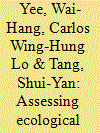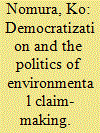|
|
|
Sort Order |
|
|
|
Items / Page
|
|
|
|
|
|
|
| Srl | Item |
| 1 |
ID:
119196


|
|
|
|
|
| Publication |
2013.
|
| Summary/Abstract |
This paper compares the key arguments of ecological modernization theory (EMT) with the reality of recent environmental reform in China. Based on data gathered from a survey and in-depth interviews with executives from Hong Kong-based enterprises operating in Guangdong province, we examine the changing roles of government, market, and civil society actors in the reform process, focusing on various types of pressures these actors have exerted on business enterprises. Compatible with Mol's (2006) conjectures, ecological concerns have gradually gained a foothold in existing political, economic, and to a lesser extent, social institutions. Yet, the relevant actors and their patterns of interactions differ from what EMT generalizes from Western European experiences. Specifically, local governments are assuming a more formalized relationship with firms in regulatory enforcement. Among market actors, organizational buyers along the supply chain have exerted more noticeable pressures on manufacturing firms than industrial associations and individual consumers. Civil society, while remaining less of an institutionalized actor in the environmental policy process, appears to pose a perceptible threat to at least some firms.
|
|
|
|
|
|
|
|
|
|
|
|
|
|
|
|
| 2 |
ID:
107695


|
|
|
|
|
| Publication |
2011.
|
| Summary/Abstract |
For some time now, Beijing has been known as a climate change laggard, refusing to commit to binding emission reduction targets at the international level. Although the Hu-Wen administration has elevated the energy and climate issue to the highest domestic political level, the rationale behind this move derives mainly from economic and energy security considerations. The framework of climate-relevant measures has been tightened, ambitious domestic targets to slow the growth of greenhouse gas output have been set out, and measures to promote the development and deployment of climate-friendly technologies implemented, thus suggesting that Beijing is increasingly incorporating environmental considerations in its policy formation. However, clearing the path toward an eco-modernized society requires major transformations in political, economic, and social institutions. This study analyzes developments in China's climate policy from an ecological modernization perspective. Although China has undertaken some remarkable climate-relevant action, this study concludes that its transition can only be partly explained by concepts of ecological modernization.
|
|
|
|
|
|
|
|
|
|
|
|
|
|
|
|
| 3 |
ID:
089887


|
|
|
|
|
| Publication |
2009.
|
| Summary/Abstract |
The rapid expansion of the Indonesian pulp industry has caused considerable environmental problems. Some argue that the state and the industry have addressed this issue rather successfully through technological amendments and effective civic involvement without hindering economic growth, which could be described as a path towards ecological modernization. However, the problems caused by Indorayon, Indonesia's first pulp and rayon company, show that this path can neglect the social aspects of sustainable development, without fully respecting the political rights of the local people, even after the end of authoritarian rule. In both the Suharto and post-Suharto periods, the state and Indorayon successfully prevented the civil society movement from making effective claims relating to their environmental concerns through oppression and a 'scientific' discourse emphasizing the economic and environmental aspects of the factory operations. Recognizing that such efforts have resulted in long-lasting social conflicts, this article illustrates the limit of the impact of democratization on environmental policy making in Indonesia, and the difficulties in using ecological modernization as a policy guideline for a sustainable society in the global South.
|
|
|
|
|
|
|
|
|
|
|
|
|
|
|
|
|
|
|
|
|